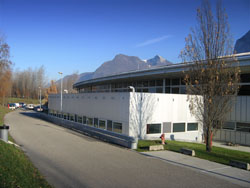- Home
- News
- General News
- SAXS specialists...
SAXS specialists in Europe meet at the ESRF
13-02-2007
European scientists working on the development of Small-Angle X-ray Scattering (SAXS) beamlines at third generation light sources have, since more than a year ago, their own forum. The SAXIER FP6 project, funded by the European Commission over four years, intends to bring together specialists with the aim of sharing their expertise using the SAXS technique. Special emphasis is given to applications in bio- and nanotechnology. The SAXIER annual meeting took place last week at the ESRF and attracted about 50 scientists from different synchrotron radiation facilities and potential users.
Share
The SAXIER meeting at the ESRF provided an opportunity for researchers involved to discuss advances in the field. Since its creation, the project has already produced seven scientific papers, 23 presentations and two co-sponsored workshops. Christian Riekel, SAXIER representative at the ESRF, explains that “this collaboration has proved very fruitful, and at present we have a post-doctoral researcher and a PhD student at the ESRF as part of this project”.
 |
|
The ID13 nanofocus extension. This is one of the SAXS beamlines. |
SAXS is a powerful technique providing unique information on mesoscale phenomena in soft condensed matter and biology. The SAXIER project includes the development of micro and nanofocusing instrumentation, cryo-SAXS environment, on-line microRaman spectroscopy, gas phase scattering from macromolecules, microfluidic devices, automated sample changers and solution scattering analysis software. The project is coordinated by the EMBL Hamburg (spokesman D. Svergun). The ESRF is a partner, together with other European light sources.
For more information, please look at www.saxier.org
Top image: A coffee break.



